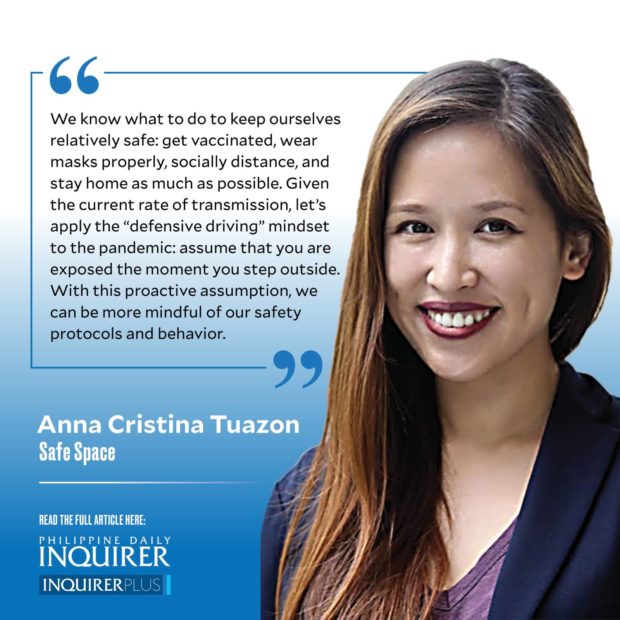Don’t panic
Our worst fears have come true: the combination of the past holiday gatherings and the arrival of Omicron has culminated in an exponential spike in COVID-19 cases. Almost half of all people tested are confirmed positive for the virus. On the ground, whole families once again are getting infected and have to isolate from each other. Some workplaces have to shut down due to the sheer number of COVID-19 cases among their employees. Classes are suspended as a significant number of students and teachers are calling in sick. Metro Manila started the year with alert level 3 and mobility restrictions are being considered for the unvaccinated. Some have decried that the start of 2022 looks eerily like we’ve traveled back in time to 2020. Understandably battle-weary, a lot are experiencing hopelessness and despair once again.
I can’t tell you with certainty that things are going to be okay; that would be patronizing. What I do know is that we’ve been through this before and we can overcome again. One benefit of time repeating itself is that now hindsight can be used as foresight. We already know what to do. We know what keeps us safe. This time around, we have the benefit of experience—so let’s not waste it.
We know what to do to keep ourselves relatively safe: get vaccinated, wear masks properly, socially distance, and stay home as much as possible. Given the current rate of transmission, let’s apply the “defensive driving” mindset to the pandemic: assume that you are exposed the moment you step outside. With this proactive assumption, we can be more mindful of our safety protocols and behavior. Hopefully we will be more diligent in disinfecting so that whatever virus we come in contact with dies at our doorstep.
We can also use the corollary mindset: assume that you are infectious and manage accordingly. If you have the telling symptoms such as cough, sore throat, colds, or fever, assume already that you are contagious and isolate properly. Do practice drills of contact tracing so that you can be more aware of your social reach and work on minimizing the number of people you can possibly expose to the virus. You have more control than you think in making sure that the virus spread stops with you. Create a plan on how to attain your basic needs if you have to self-quarantine; alternatively, plan for where to go if it is not safe to quarantine in your household. If we have “go-bags” for disaster preparedness, let’s have quarantine go-bags: ensure that you have enough essentials to last two weeks of quarantine at home. Don’t wait until someone is already positive and end up scrambling for supplies, which sometimes leaves us with fewer affordable options. At the very least, make a deal with a friend to be each other’s supply runners in the event of a quarantine. You can also get acquainted with your barangay’s resources such as isolation facilities and treatment resources.
Do not be complacent. While we are gaining ground on vaccinations and most cases seem to be asymptomatic or mild, the pandemic is still far from over. We saw how complacency during the holidays has led us to now. Let’s learn from our mistakes. Sometimes, however, it is not overconfidence but despair and hopelessness that lead us to a resigned sense of complacency. We must remember that the pandemic is ultimately solvable. What this solution looks like, we do not know for certain. But homeostasis will return. It may be that COVID-19 mutates to a nonfatal, relatively harmless form. Effective treatment may be developed and vaccines can be improved upon. The solution might lie in behavioral adaptation—it may change how we live but still we live on. Until the final solution presents itself, we must not be reckless and complacent. If not for ourselves, don’t give up for our vulnerable household members and our community.
Do not panic. Stress can sabotage all your careful planning and vigilance for safety by crashing your immune system, making you more vulnerable to infection. Once you are as physically and logistically prepared as can be, then it’s time to stop worrying. The final hurdle is fear. Remind yourself that you are doing the best that you can. Remind yourself that we’ve once overcome what we fear and we can do so again. We’ve gone through lockdowns before. We’ve also gone through more deaths before. Just as our bodies produce antibodies every time it encounters a foreign agent to help us in future infections, we produce wisdom with every experience so we can manage better what life throws at us.





















